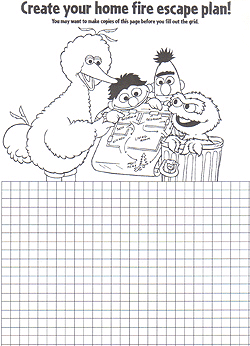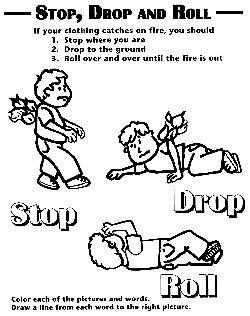10 Tips to Home Fire Safety
1. Install smoke alarms
Smoke alarms save lives by warning you about a fire while there's time to escape. Install alarms on every floor of your home, including the basement, and outside each sleeping area - inside as well, if you sleep with the door closed - and test them once a month. Smoke alarms lose their sensitivity over time. Replace alarms 10 or more years old.
2. Automatic home fire sprinkler system
Consider installing an automatic home fire sprinkler system in your home. Sprinklers can contain and even extinguish a home fire in less time than it takes the fire department to arrive.
3. Plan your escape
If there's a fire, you have to get out fast, so be prepared. Draw a floor plan of your home, marking two ways out of each room. Go over the plan with your household so that everyone knows how to escape if there's a fire, then physically walk through each escape route. Decide on an outside meeting place in front of your home where everyone will meet after they've escaped. Practice your escape plan by holding a fire drill twice a year.
4. In a fire, crawl low under smoke
Smoke and heat rise, so during a fire there's cleaner, cooler air near the floor. Always try another exit if you encounter smoke when you are escaping a fire. But if you have to escape through smoke, crawl on your hands and knees with you head I to 2 feet (30 to 60 centimeters) above the floor.
creat your home fire escape plan
5. Smokers' safety
In North America, more fatal fires start from smoking than from any other cause. Don't smoke in bed or when you're drowsy. Give smokers large, deep, non-tip ash- trays, and soak butts and ashes before dumping them. If someone's been smoking in your home, check on and around furniture, including under cushions, for smoldering cigarettes.
6. Cook safely
Always stay with the stove when cooking, or turn off burners if you walk away. Wear clothes with snug - rolled up - sleeves when you cook to avoid catching your clothes on fire. Turn pot handles inward where you can't bump them and children can't grab them, and enforce a "kid-free zone" 3 feet around your stove when you cook.
7. Keep matches and lighters out of sight
Keep matches and lighters away from children. Lock them up high and out of reach, and use only child- resistant lighters. Teach young children to tell you if they find matches or lighters; teach older children to bring matches and lighters to an adult before they fall into young hands.
8. Use electricity safely
Know the warning signs of problems for electrical appliances: flickering lights, smoke or odd smells, blowing fuses, tripping circuit breakers or frayed or cracked cords. Check carefully any appliances that display a warning sign, and repair or replace. Don't run extension cords across doorways or where they can be walked on or pinched by furniture.
9. Space heaters
Keep portable and other space heaters at least 3 feet away from anything that can burn - including you - and turn heaters off when 'you leave home or go to bed. Have chimneys and furnaces inspected by a professional at the start of each heating season.
10. Stop, drop, and roll
If your clothes catch fire, stop - don't run. Drop gently to the ground, cover your face with your hands and roll over and over or back and forth to smother the flames. Cool the burn with cool water for 10 - 15 minutes. Call for help.



Junior Members Program
- Any Male or Female wishing to apply for membership must be 16 yrs of age at the time their application is submitted to the Folsom Fire Company.
- All junior members will be on a probationary period for 1 year to the date they were accepted into the company.
- Junior members may participate in organized training activities,in which a SENIOR Member of the fire company is present and who is observing the training activities and supervising the junior member.
- All aspects of fire suppression training EXCEPT INTERIOR LIVE fire extinguishment.
- Water supply training,safety training and personnel protection equipment training.
- All juniors must take a standard first aid class and basic fire training class within a reasonable time of their acceptance into the fire company.
- All junior members will assist in restoring and cleaning fire equipment after the emergency.
- Junior members will assist in keeping the fire house,equipment and engine room clean.
- Junior members will be allowed to ride the engines on an emergency,however the junior member will be limited to the second engine out,unless directed by the OIC(officer in Charge) or senior member.The junior member must be seated at all times while the engine is moving and is restricted from riding on the tailboard of any engine where the members could ride.
Junior members will be permitted to participate in monthly meetings,fund raising events,department training and fire
company social events
TRAINING REQUIREMENTS
- Junior Members must have completed a course of training equal to the standards of basic firefighting established by the State of Pennsylvania(Module1).Any junior member who does not complete the standards of firefighting will be limited to the activities of the fire department.
- Junior members once they have completed Module 1 will be allowed to attack the fire with hoselines as part of exterior operations.
- Junior members will be allowed to set up ground ladders with a senior member or OIC once they have completed Module 1.
- Junior members will be allowed to set up a positive pressure ventilation as part of exterior operations once they have completed Module 1.
- Junior members will be allowed to attend any fire related classes only after they have completed Module 1 and have the permission of the Chief of the Fire Department or Training Officer.
- All juniors must take a standard first aid class and basic fire training class within a reasonable time of their acceptance into the fire company.

